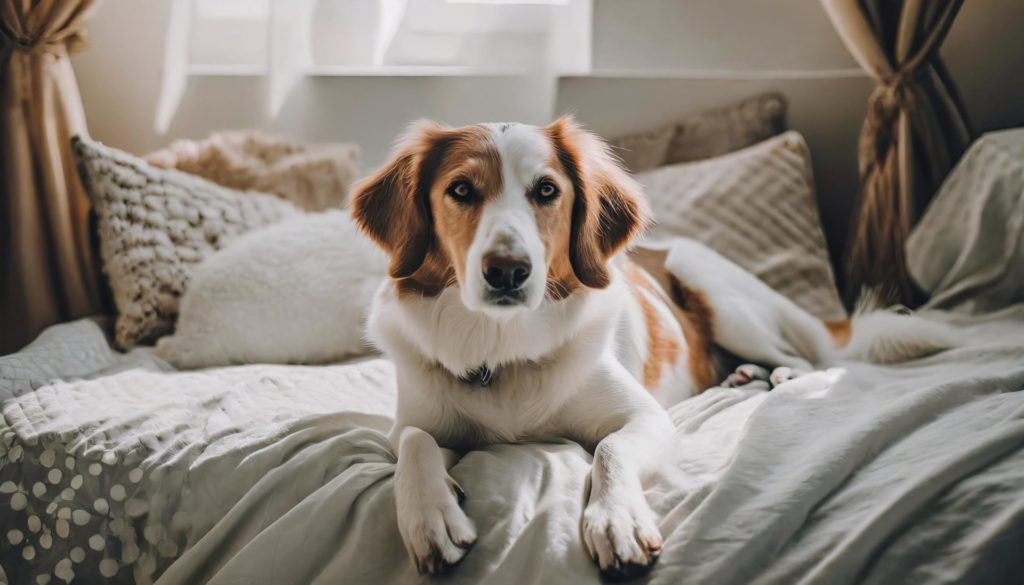Understanding Why Your Dog Pees on Your Bed and How to Address It.

One of the perplexing and frustrating behaviors that dog owners may encounter is the habit of their furry companions urinating on the bed. Why does my dog pee on my bed?
While this behavior can be both inconvenient and unpleasant, it’s essential to approach the issue with understanding rather than frustration.
Dogs communicate through their actions, and in the case of bed-wetting, there are several potential reasons behind this behavior.
Why Your Dog Pees On Your Bed
- Territorial Marking: Dogs are territorial animals, and they often use urine as a way to mark their territory. If your dog perceives the bed as a significant part of their territory, especially if it’s shared with other pets, they may feel compelled to mark it with their scent. This behavior is more common in unneutered or unspayed dogs, as they have a stronger instinct to establish dominance.
- Anxiety or Stress: Changes in the household or the introduction of new elements, such as a new pet, family member, or a change in routine, can cause stress and anxiety in dogs. Some dogs may respond to these changes by urinating on the bed as a way to cope with their emotions and establish a sense of security.
- Medical Issues: In some cases, bed-wetting may be a symptom of an underlying medical problem. Urinary tract infections, bladder stones, diabetes, and other health issues can lead to increased urgency and frequency of urination. If your dog’s bed-wetting is sudden or accompanied by other concerning symptoms, it’s crucial to consult with a veterinarian to rule out any potential medical issues.
- Incomplete Housetraining: Young dogs or dogs that haven’t been properly housetrained may have accidents, including urinating on the bed. It’s essential to be patient and consistent with training, using positive reinforcement to encourage appropriate elimination behavior.
- Aging and Incontinence: As dogs age, they may experience a decline in bladder control, leading to incontinence. If your senior dog is peeing on the bed, it could be a result of age-related issues, such as weakened muscles or an underlying medical condition. Consulting with a veterinarian can help determine the cause and explore management options.

Addressing the Issue: why does my dog pee on my bed?
- Consult with a Veterinarian: If your dog’s bed-wetting is a sudden or recurring issue, it’s crucial to rule out any potential medical problems. A visit to the veterinarian can help identify and address underlying health issues.
- Reinforce Positive Behavior: Positive reinforcement is key when addressing any behavioral issue. Praise and reward your dog when they eliminate in appropriate areas. Avoid punishment, as it can increase anxiety and exacerbate the problem.
- Maintain a Consistent Routine: Dogs thrive on routine, and maintaining a consistent schedule for feeding, walks, and bathroom breaks can help reduce stress and anxiety. A regular routine also aids in reinforcing housetraining.
- Thoroughly Clean and Deodorize: To prevent your dog from returning to the same spot, it’s crucial to thoroughly clean and deodorize the affected area. Use enzymatic cleaners specifically designed to eliminate pet odors.
- Create a Safe and Comfortable Environment: Address any potential stressors in your dog’s environment and ensure they have a comfortable, secure space. Providing a designated area with their bed and toys can help alleviate anxiety.

Conclusion for why does my dog pee on my bed:
Understanding why your dog is peeing on your bed is the first step toward finding a solution.
Whether it’s a behavioral issue, a response to stress, or a medical concern, patience, consistency, and positive reinforcement are essential in addressing and preventing bed-wetting.
If the problem persists, seeking guidance from a veterinarian or a professional dog trainer can provide additional insights and strategies tailored to your dog’s specific needs.





